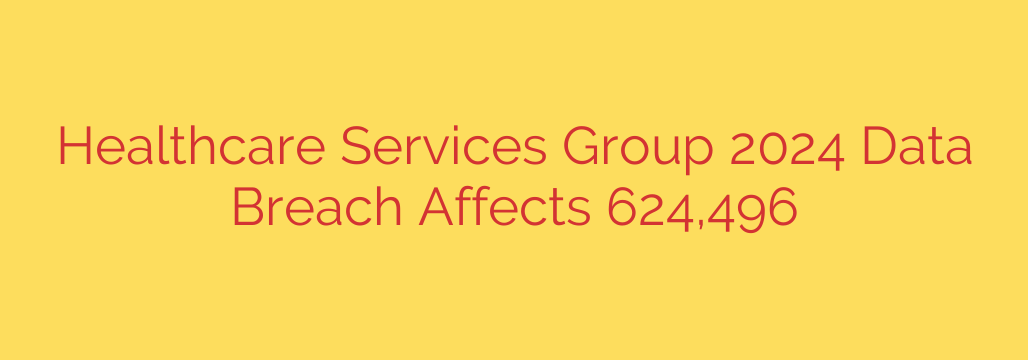
Healthcare Services Group Data Breach Exposes Sensitive Information of Over 624,000 Individuals
A significant data breach at Healthcare Services Group (HCSG), a major provider of housekeeping, dining, and nutrition services to healthcare facilities, has compromised the personal and medical data of more than 624,000 people. The incident has raised serious concerns about the security of sensitive information handled by third-party vendors in the healthcare industry.
HCSG provides essential services to a wide range of facilities, including nursing homes, retirement communities, rehabilitation centers, and hospitals across the United States. This breach affects not only the company’s own employees but also the staff and, critically, the residents and patients of the facilities it serves.
What Information Was Compromised?
The investigation into the breach revealed that an unauthorized party gained access to HCSG’s network and exfiltrated files containing a vast amount of highly sensitive data. If you have received a notification letter, your information may have been exposed.
The compromised data includes:
- Full Names
- Social Security numbers (SSNs)
- Home Addresses
- Dates of Birth
- Phone Numbers
- Health Insurance Information
- Medical Information, including diagnoses and treatment details
The inclusion of both personal identifiers like SSNs and protected health information makes this breach particularly dangerous, creating a high risk for identity theft and medical fraud.
Who Is at Risk?
The impact of this breach extends far beyond HCSG’s direct employees. Because the company works closely with numerous healthcare providers, the compromised data belongs to a wide network of individuals, including:
- Current and former HCSG employees.
- Employees of client facilities that use HCSG’s services.
- Residents and patients of these nursing homes, hospitals, and long-term care facilities.
If you are a resident or employee at a facility that partners with Healthcare Services Group, you may be affected even if you have never directly interacted with the company.
Details of the Security Incident
According to official reports, HCSG first detected suspicious activity on its network in June 2023. The company launched an investigation to understand the scope of the incident and determine what data was impacted. The lengthy analysis concluded earlier this year, and HCSG began sending out official data breach notification letters to affected individuals on April 26, 2024.
In response to the incident, HCSG has stated that it has secured its network and is reviewing its existing data security policies. The company is offering one year of complimentary credit monitoring and identity theft protection services to those impacted by the breach.
How to Protect Yourself After the HCSG Data Breach
If you believe you may be affected by this data breach, it is crucial to take immediate steps to protect your personal and financial information. Do not wait to become a victim of fraud.
1. Enroll in the Complimentary Credit Monitoring: If you receive a notification letter, take advantage of the free credit monitoring service being offered. This service will alert you to any suspicious activity on your credit reports, such as new accounts being opened in your name.
2. Place a Fraud Alert or Credit Freeze: Contact one of the three major credit bureaus (Equifax, Experian, or TransUnion) to place a fraud alert on your file. This alert warns creditors to take extra steps to verify your identity before opening a new line of credit. For even stronger protection, consider a credit freeze, which restricts access to your credit report, making it much more difficult for identity thieves to open new accounts.
3. Scrutinize Your Financial and Medical Statements: Carefully review your bank statements, credit card bills, and Explanation of Benefits (EOB) from your health insurer. Look for any unfamiliar charges or medical services you did not receive. Medical identity theft can be difficult to detect, so be vigilant.
4. Be Wary of Phishing Scams: Cybercriminals often use stolen data to create highly convincing phishing emails, text messages, and phone calls. Be suspicious of any unsolicited communications that ask for personal information, even if they appear to be from a legitimate company. Never click on suspicious links or download attachments.
5. Secure Your Online Accounts: If you reuse passwords across multiple websites, change them immediately, especially for financial, healthcare, and email accounts. Enable two-factor authentication (2FA) wherever possible for an extra layer of security.
This incident serves as a stark reminder of the widespread impact of third-party data breaches and the critical importance of safeguarding personal information. By taking proactive security measures, you can significantly reduce your risk of becoming a victim of identity theft and fraud.
Source: https://securityaffairs.com/181608/data-breach/healthcare-services-group-discloses-2024-data-breach-that-impacted-624496-people.html








